Business Law Report: English Legal System, Business Impact and ADR
VerifiedAdded on 2020/09/08
|14
|3856
|70
Report
AI Summary
This report provides a comprehensive overview of business law, focusing on the English legal system and its implications for businesses. It begins by outlining the structure of the English legal system, including its sources of law such as statutes, common law, and administrative agencies. The report then examines the role of the government in lawmaking, detailing the processes involved in creating legislation within the UK. Furthermore, it explores the impact of various laws, including the Employment Rights Act, on business operations, using the European Business School of Management (EBSM) as a case study. The report also delves into different types of business organizations, alternative dispute resolution (ADR) methods, and alternative sources of legal advice. The analysis covers the legal requirements for starting a business in the UK, including registration, taxation, and compliance with regulations like the Employment Act. The report concludes by summarizing the key aspects of business law and its practical relevance for organizations operating within the UK.
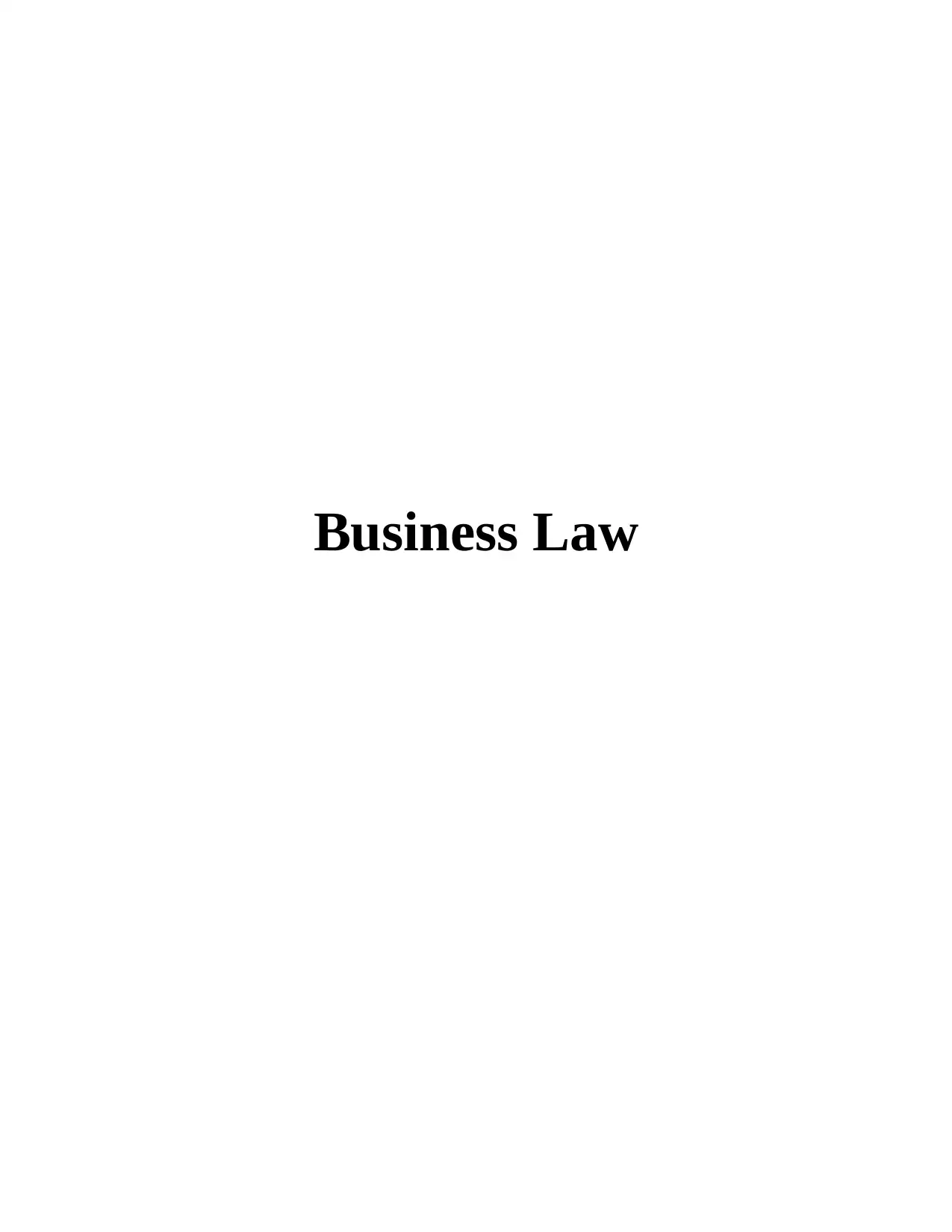
Business Law
Paraphrase This Document
Need a fresh take? Get an instant paraphrase of this document with our AI Paraphraser
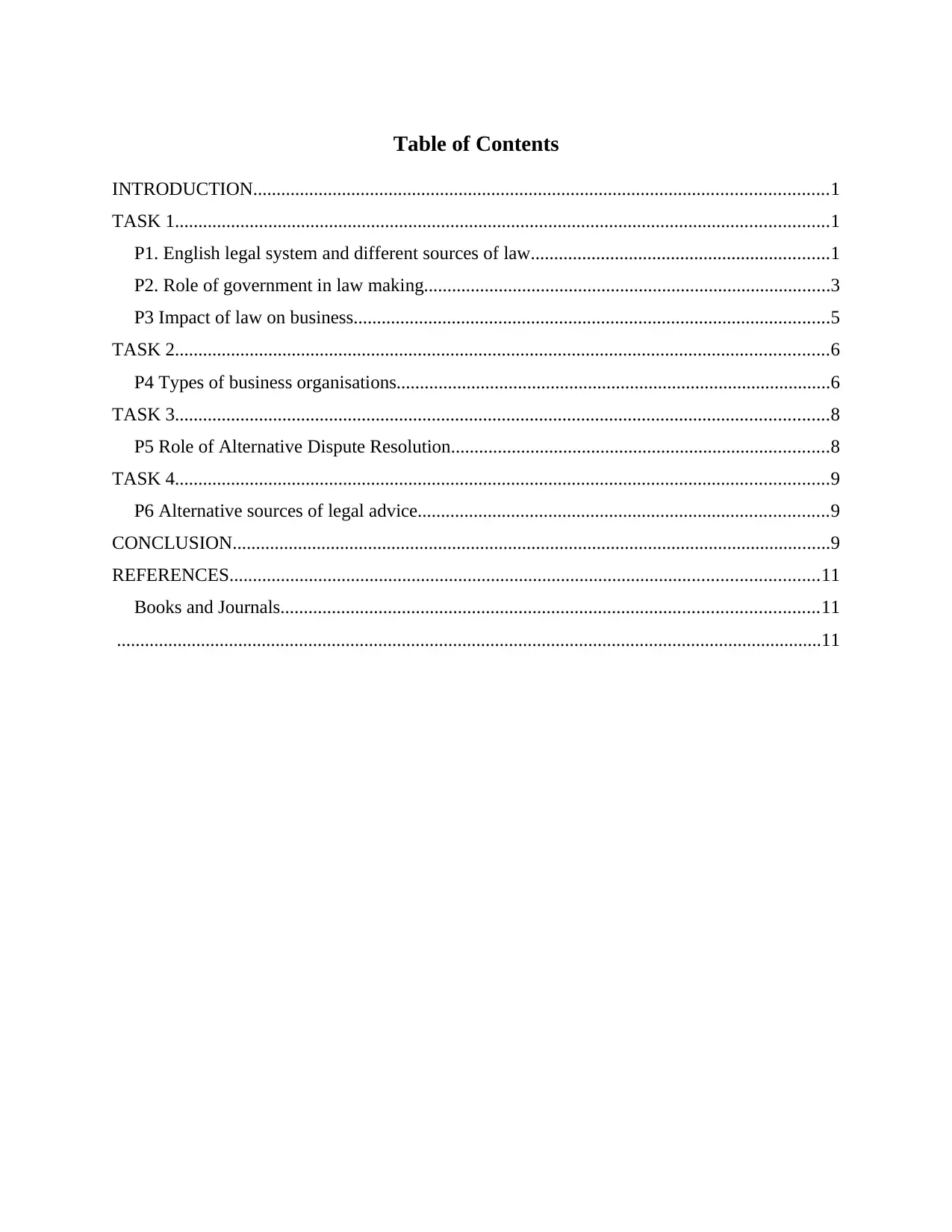
Table of Contents
INTRODUCTION...........................................................................................................................1
TASK 1............................................................................................................................................1
P1. English legal system and different sources of law................................................................1
P2. Role of government in law making.......................................................................................3
P3 Impact of law on business......................................................................................................5
TASK 2............................................................................................................................................6
P4 Types of business organisations.............................................................................................6
TASK 3............................................................................................................................................8
P5 Role of Alternative Dispute Resolution.................................................................................8
TASK 4............................................................................................................................................9
P6 Alternative sources of legal advice........................................................................................9
CONCLUSION................................................................................................................................9
REFERENCES..............................................................................................................................11
Books and Journals...................................................................................................................11
.......................................................................................................................................................11
INTRODUCTION...........................................................................................................................1
TASK 1............................................................................................................................................1
P1. English legal system and different sources of law................................................................1
P2. Role of government in law making.......................................................................................3
P3 Impact of law on business......................................................................................................5
TASK 2............................................................................................................................................6
P4 Types of business organisations.............................................................................................6
TASK 3............................................................................................................................................8
P5 Role of Alternative Dispute Resolution.................................................................................8
TASK 4............................................................................................................................................9
P6 Alternative sources of legal advice........................................................................................9
CONCLUSION................................................................................................................................9
REFERENCES..............................................................................................................................11
Books and Journals...................................................................................................................11
.......................................................................................................................................................11

⊘ This is a preview!⊘
Do you want full access?
Subscribe today to unlock all pages.

Trusted by 1+ million students worldwide
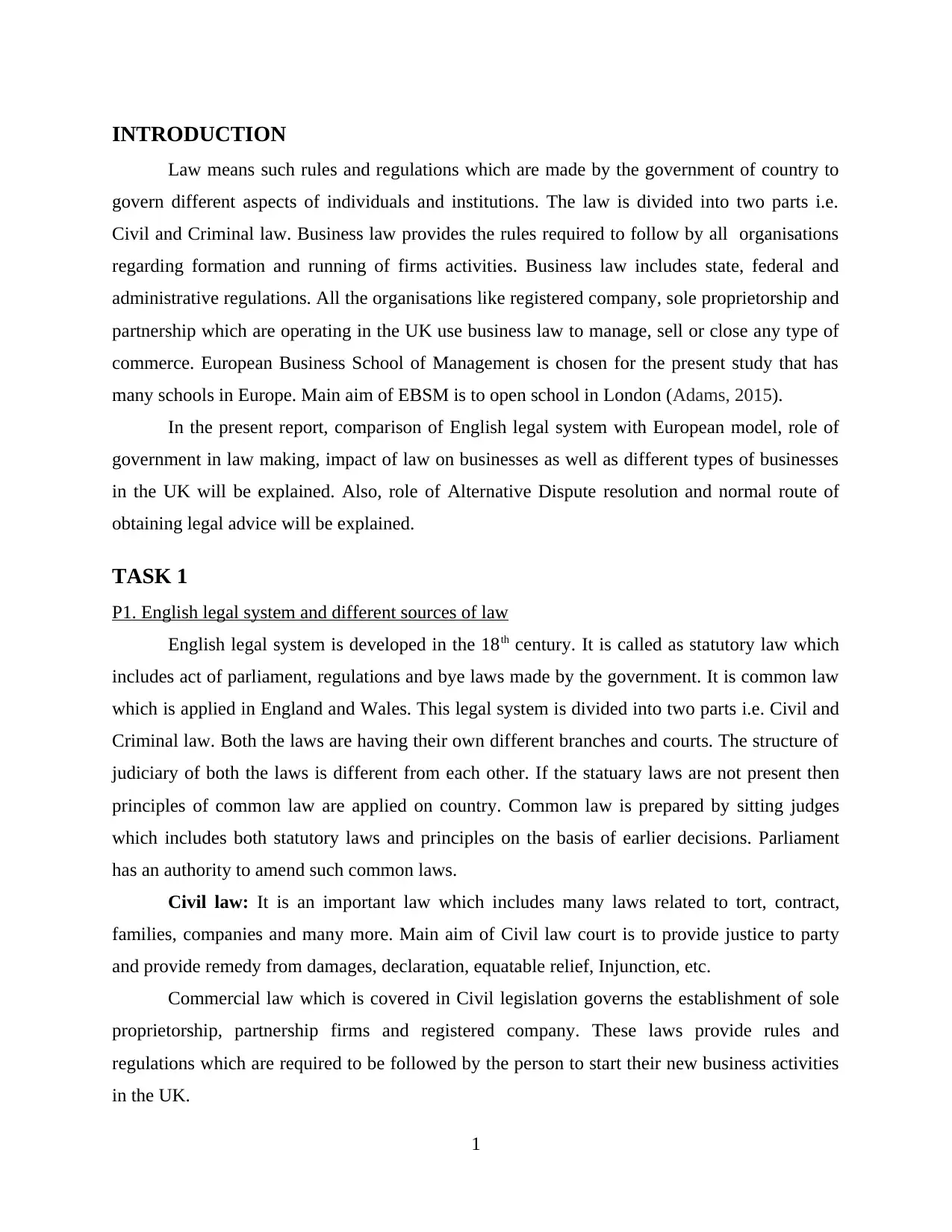
INTRODUCTION
Law means such rules and regulations which are made by the government of country to
govern different aspects of individuals and institutions. The law is divided into two parts i.e.
Civil and Criminal law. Business law provides the rules required to follow by all organisations
regarding formation and running of firms activities. Business law includes state, federal and
administrative regulations. All the organisations like registered company, sole proprietorship and
partnership which are operating in the UK use business law to manage, sell or close any type of
commerce. European Business School of Management is chosen for the present study that has
many schools in Europe. Main aim of EBSM is to open school in London (Adams, 2015).
In the present report, comparison of English legal system with European model, role of
government in law making, impact of law on businesses as well as different types of businesses
in the UK will be explained. Also, role of Alternative Dispute resolution and normal route of
obtaining legal advice will be explained.
TASK 1
P1. English legal system and different sources of law
English legal system is developed in the 18th century. It is called as statutory law which
includes act of parliament, regulations and bye laws made by the government. It is common law
which is applied in England and Wales. This legal system is divided into two parts i.e. Civil and
Criminal law. Both the laws are having their own different branches and courts. The structure of
judiciary of both the laws is different from each other. If the statuary laws are not present then
principles of common law are applied on country. Common law is prepared by sitting judges
which includes both statutory laws and principles on the basis of earlier decisions. Parliament
has an authority to amend such common laws.
Civil law: It is an important law which includes many laws related to tort, contract,
families, companies and many more. Main aim of Civil law court is to provide justice to party
and provide remedy from damages, declaration, equatable relief, Injunction, etc.
Commercial law which is covered in Civil legislation governs the establishment of sole
proprietorship, partnership firms and registered company. These laws provide rules and
regulations which are required to be followed by the person to start their new business activities
in the UK.
1
Law means such rules and regulations which are made by the government of country to
govern different aspects of individuals and institutions. The law is divided into two parts i.e.
Civil and Criminal law. Business law provides the rules required to follow by all organisations
regarding formation and running of firms activities. Business law includes state, federal and
administrative regulations. All the organisations like registered company, sole proprietorship and
partnership which are operating in the UK use business law to manage, sell or close any type of
commerce. European Business School of Management is chosen for the present study that has
many schools in Europe. Main aim of EBSM is to open school in London (Adams, 2015).
In the present report, comparison of English legal system with European model, role of
government in law making, impact of law on businesses as well as different types of businesses
in the UK will be explained. Also, role of Alternative Dispute resolution and normal route of
obtaining legal advice will be explained.
TASK 1
P1. English legal system and different sources of law
English legal system is developed in the 18th century. It is called as statutory law which
includes act of parliament, regulations and bye laws made by the government. It is common law
which is applied in England and Wales. This legal system is divided into two parts i.e. Civil and
Criminal law. Both the laws are having their own different branches and courts. The structure of
judiciary of both the laws is different from each other. If the statuary laws are not present then
principles of common law are applied on country. Common law is prepared by sitting judges
which includes both statutory laws and principles on the basis of earlier decisions. Parliament
has an authority to amend such common laws.
Civil law: It is an important law which includes many laws related to tort, contract,
families, companies and many more. Main aim of Civil law court is to provide justice to party
and provide remedy from damages, declaration, equatable relief, Injunction, etc.
Commercial law which is covered in Civil legislation governs the establishment of sole
proprietorship, partnership firms and registered company. These laws provide rules and
regulations which are required to be followed by the person to start their new business activities
in the UK.
1
Paraphrase This Document
Need a fresh take? Get an instant paraphrase of this document with our AI Paraphraser
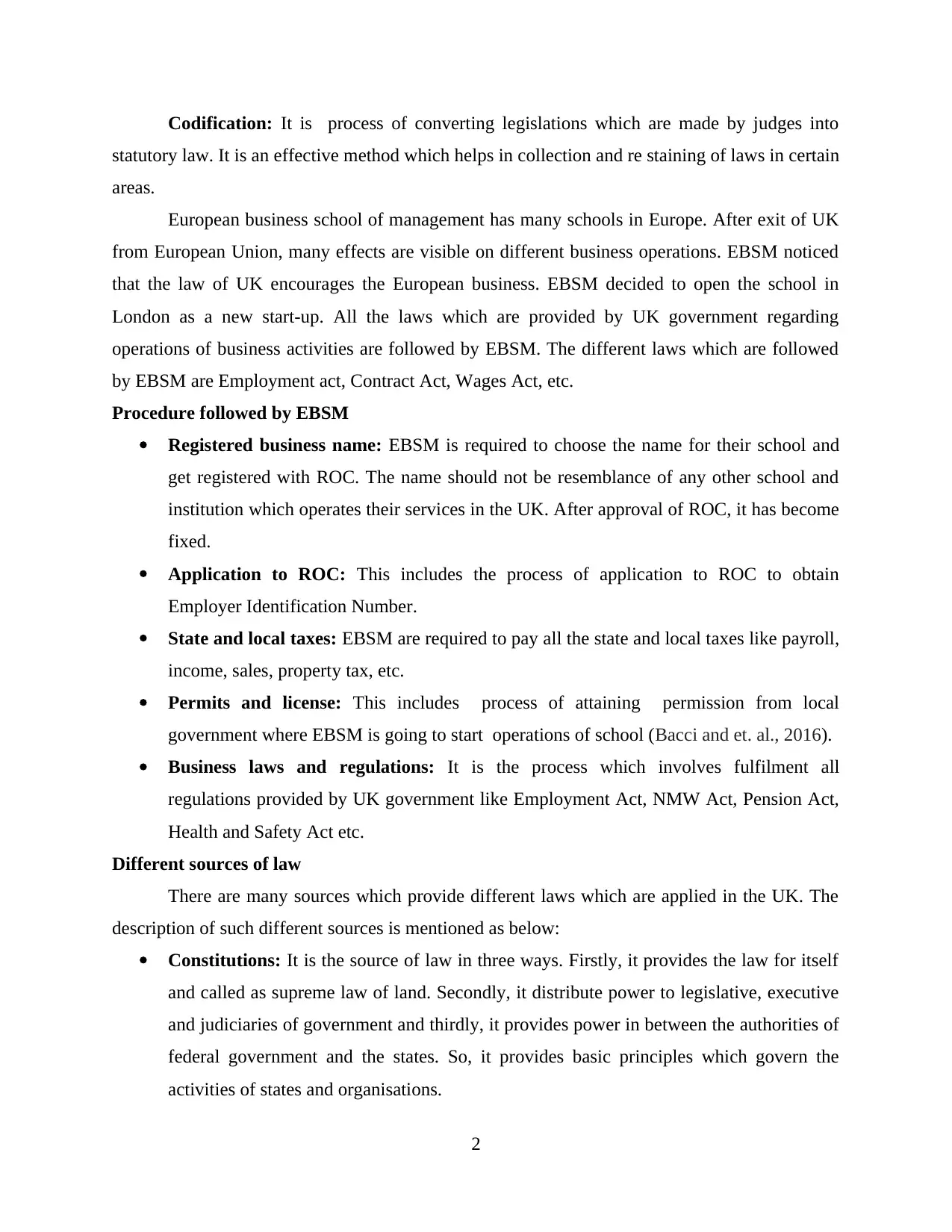
Codification: It is process of converting legislations which are made by judges into
statutory law. It is an effective method which helps in collection and re staining of laws in certain
areas.
European business school of management has many schools in Europe. After exit of UK
from European Union, many effects are visible on different business operations. EBSM noticed
that the law of UK encourages the European business. EBSM decided to open the school in
London as a new start-up. All the laws which are provided by UK government regarding
operations of business activities are followed by EBSM. The different laws which are followed
by EBSM are Employment act, Contract Act, Wages Act, etc.
Procedure followed by EBSM
Registered business name: EBSM is required to choose the name for their school and
get registered with ROC. The name should not be resemblance of any other school and
institution which operates their services in the UK. After approval of ROC, it has become
fixed.
Application to ROC: This includes the process of application to ROC to obtain
Employer Identification Number.
State and local taxes: EBSM are required to pay all the state and local taxes like payroll,
income, sales, property tax, etc.
Permits and license: This includes process of attaining permission from local
government where EBSM is going to start operations of school (Bacci and et. al., 2016).
Business laws and regulations: It is the process which involves fulfilment all
regulations provided by UK government like Employment Act, NMW Act, Pension Act,
Health and Safety Act etc.
Different sources of law
There are many sources which provide different laws which are applied in the UK. The
description of such different sources is mentioned as below:
Constitutions: It is the source of law in three ways. Firstly, it provides the law for itself
and called as supreme law of land. Secondly, it distribute power to legislative, executive
and judiciaries of government and thirdly, it provides power in between the authorities of
federal government and the states. So, it provides basic principles which govern the
activities of states and organisations.
2
statutory law. It is an effective method which helps in collection and re staining of laws in certain
areas.
European business school of management has many schools in Europe. After exit of UK
from European Union, many effects are visible on different business operations. EBSM noticed
that the law of UK encourages the European business. EBSM decided to open the school in
London as a new start-up. All the laws which are provided by UK government regarding
operations of business activities are followed by EBSM. The different laws which are followed
by EBSM are Employment act, Contract Act, Wages Act, etc.
Procedure followed by EBSM
Registered business name: EBSM is required to choose the name for their school and
get registered with ROC. The name should not be resemblance of any other school and
institution which operates their services in the UK. After approval of ROC, it has become
fixed.
Application to ROC: This includes the process of application to ROC to obtain
Employer Identification Number.
State and local taxes: EBSM are required to pay all the state and local taxes like payroll,
income, sales, property tax, etc.
Permits and license: This includes process of attaining permission from local
government where EBSM is going to start operations of school (Bacci and et. al., 2016).
Business laws and regulations: It is the process which involves fulfilment all
regulations provided by UK government like Employment Act, NMW Act, Pension Act,
Health and Safety Act etc.
Different sources of law
There are many sources which provide different laws which are applied in the UK. The
description of such different sources is mentioned as below:
Constitutions: It is the source of law in three ways. Firstly, it provides the law for itself
and called as supreme law of land. Secondly, it distribute power to legislative, executive
and judiciaries of government and thirdly, it provides power in between the authorities of
federal government and the states. So, it provides basic principles which govern the
activities of states and organisations.
2
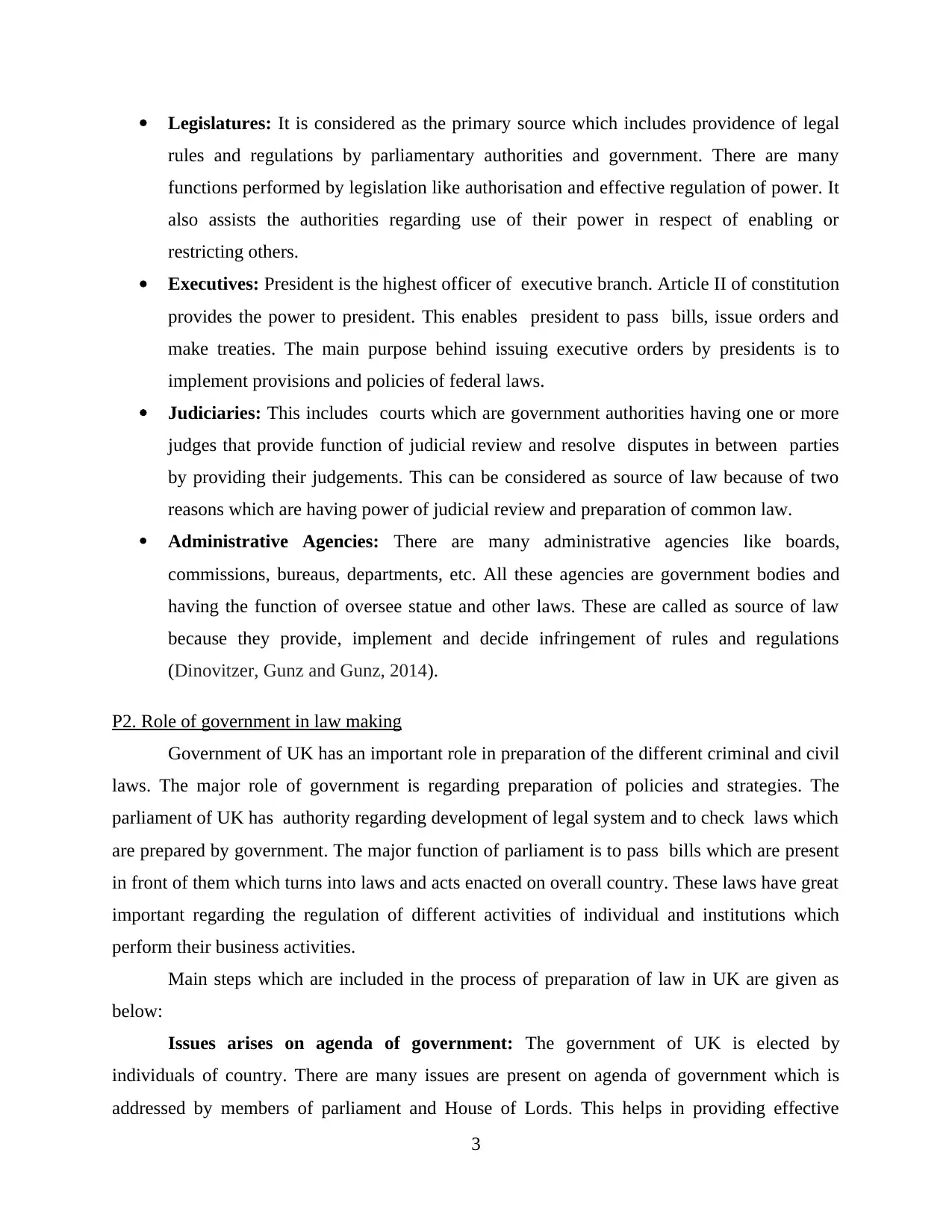
Legislatures: It is considered as the primary source which includes providence of legal
rules and regulations by parliamentary authorities and government. There are many
functions performed by legislation like authorisation and effective regulation of power. It
also assists the authorities regarding use of their power in respect of enabling or
restricting others.
Executives: President is the highest officer of executive branch. Article II of constitution
provides the power to president. This enables president to pass bills, issue orders and
make treaties. The main purpose behind issuing executive orders by presidents is to
implement provisions and policies of federal laws.
Judiciaries: This includes courts which are government authorities having one or more
judges that provide function of judicial review and resolve disputes in between parties
by providing their judgements. This can be considered as source of law because of two
reasons which are having power of judicial review and preparation of common law.
Administrative Agencies: There are many administrative agencies like boards,
commissions, bureaus, departments, etc. All these agencies are government bodies and
having the function of oversee statue and other laws. These are called as source of law
because they provide, implement and decide infringement of rules and regulations
(Dinovitzer, Gunz and Gunz, 2014).
P2. Role of government in law making
Government of UK has an important role in preparation of the different criminal and civil
laws. The major role of government is regarding preparation of policies and strategies. The
parliament of UK has authority regarding development of legal system and to check laws which
are prepared by government. The major function of parliament is to pass bills which are present
in front of them which turns into laws and acts enacted on overall country. These laws have great
important regarding the regulation of different activities of individual and institutions which
perform their business activities.
Main steps which are included in the process of preparation of law in UK are given as
below:
Issues arises on agenda of government: The government of UK is elected by
individuals of country. There are many issues are present on agenda of government which is
addressed by members of parliament and House of Lords. This helps in providing effective
3
rules and regulations by parliamentary authorities and government. There are many
functions performed by legislation like authorisation and effective regulation of power. It
also assists the authorities regarding use of their power in respect of enabling or
restricting others.
Executives: President is the highest officer of executive branch. Article II of constitution
provides the power to president. This enables president to pass bills, issue orders and
make treaties. The main purpose behind issuing executive orders by presidents is to
implement provisions and policies of federal laws.
Judiciaries: This includes courts which are government authorities having one or more
judges that provide function of judicial review and resolve disputes in between parties
by providing their judgements. This can be considered as source of law because of two
reasons which are having power of judicial review and preparation of common law.
Administrative Agencies: There are many administrative agencies like boards,
commissions, bureaus, departments, etc. All these agencies are government bodies and
having the function of oversee statue and other laws. These are called as source of law
because they provide, implement and decide infringement of rules and regulations
(Dinovitzer, Gunz and Gunz, 2014).
P2. Role of government in law making
Government of UK has an important role in preparation of the different criminal and civil
laws. The major role of government is regarding preparation of policies and strategies. The
parliament of UK has authority regarding development of legal system and to check laws which
are prepared by government. The major function of parliament is to pass bills which are present
in front of them which turns into laws and acts enacted on overall country. These laws have great
important regarding the regulation of different activities of individual and institutions which
perform their business activities.
Main steps which are included in the process of preparation of law in UK are given as
below:
Issues arises on agenda of government: The government of UK is elected by
individuals of country. There are many issues are present on agenda of government which is
addressed by members of parliament and House of Lords. This helps in providing effective
3
⊘ This is a preview!⊘
Do you want full access?
Subscribe today to unlock all pages.

Trusted by 1+ million students worldwide
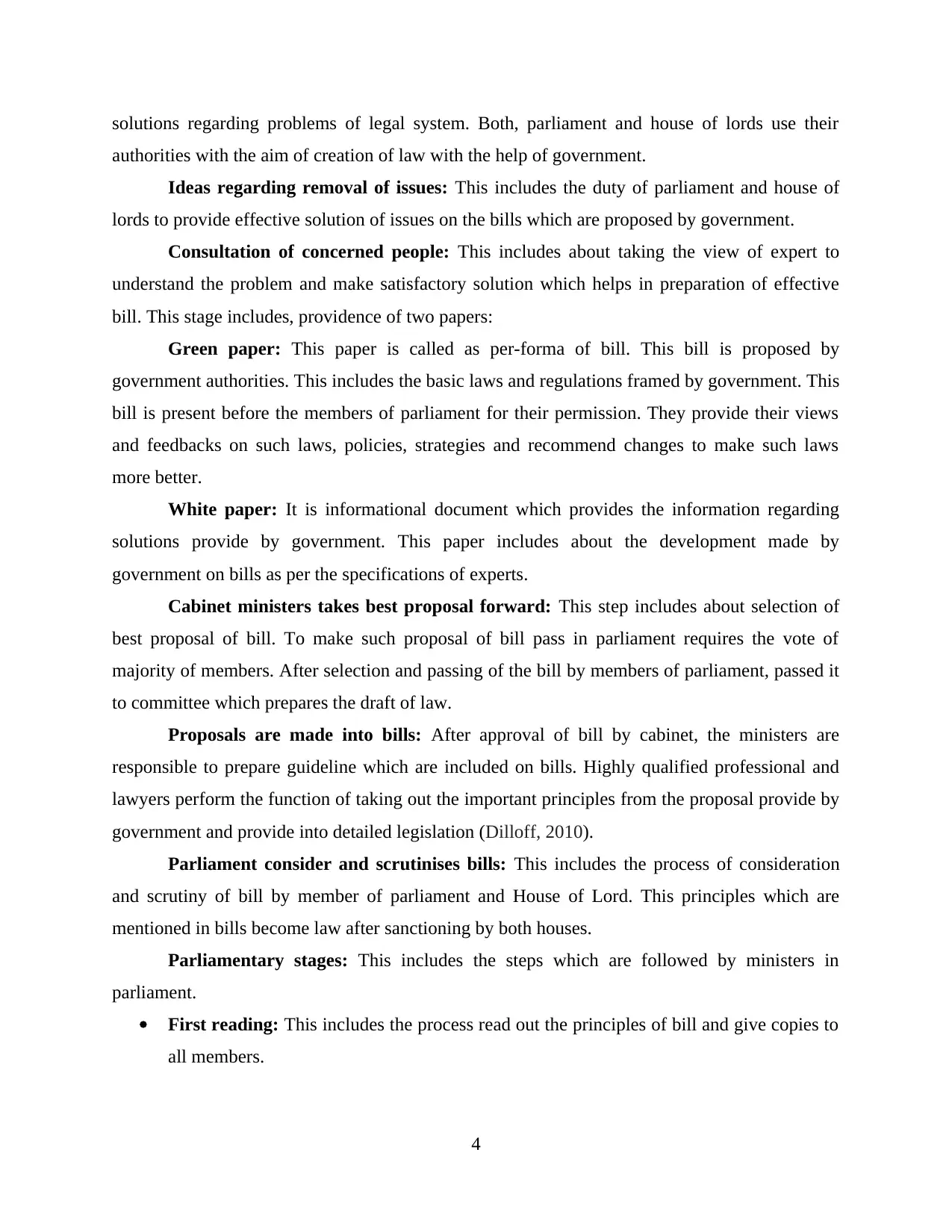
solutions regarding problems of legal system. Both, parliament and house of lords use their
authorities with the aim of creation of law with the help of government.
Ideas regarding removal of issues: This includes the duty of parliament and house of
lords to provide effective solution of issues on the bills which are proposed by government.
Consultation of concerned people: This includes about taking the view of expert to
understand the problem and make satisfactory solution which helps in preparation of effective
bill. This stage includes, providence of two papers:
Green paper: This paper is called as per-forma of bill. This bill is proposed by
government authorities. This includes the basic laws and regulations framed by government. This
bill is present before the members of parliament for their permission. They provide their views
and feedbacks on such laws, policies, strategies and recommend changes to make such laws
more better.
White paper: It is informational document which provides the information regarding
solutions provide by government. This paper includes about the development made by
government on bills as per the specifications of experts.
Cabinet ministers takes best proposal forward: This step includes about selection of
best proposal of bill. To make such proposal of bill pass in parliament requires the vote of
majority of members. After selection and passing of the bill by members of parliament, passed it
to committee which prepares the draft of law.
Proposals are made into bills: After approval of bill by cabinet, the ministers are
responsible to prepare guideline which are included on bills. Highly qualified professional and
lawyers perform the function of taking out the important principles from the proposal provide by
government and provide into detailed legislation (Dilloff, 2010).
Parliament consider and scrutinises bills: This includes the process of consideration
and scrutiny of bill by member of parliament and House of Lord. This principles which are
mentioned in bills become law after sanctioning by both houses.
Parliamentary stages: This includes the steps which are followed by ministers in
parliament.
First reading: This includes the process read out the principles of bill and give copies to
all members.
4
authorities with the aim of creation of law with the help of government.
Ideas regarding removal of issues: This includes the duty of parliament and house of
lords to provide effective solution of issues on the bills which are proposed by government.
Consultation of concerned people: This includes about taking the view of expert to
understand the problem and make satisfactory solution which helps in preparation of effective
bill. This stage includes, providence of two papers:
Green paper: This paper is called as per-forma of bill. This bill is proposed by
government authorities. This includes the basic laws and regulations framed by government. This
bill is present before the members of parliament for their permission. They provide their views
and feedbacks on such laws, policies, strategies and recommend changes to make such laws
more better.
White paper: It is informational document which provides the information regarding
solutions provide by government. This paper includes about the development made by
government on bills as per the specifications of experts.
Cabinet ministers takes best proposal forward: This step includes about selection of
best proposal of bill. To make such proposal of bill pass in parliament requires the vote of
majority of members. After selection and passing of the bill by members of parliament, passed it
to committee which prepares the draft of law.
Proposals are made into bills: After approval of bill by cabinet, the ministers are
responsible to prepare guideline which are included on bills. Highly qualified professional and
lawyers perform the function of taking out the important principles from the proposal provide by
government and provide into detailed legislation (Dilloff, 2010).
Parliament consider and scrutinises bills: This includes the process of consideration
and scrutiny of bill by member of parliament and House of Lord. This principles which are
mentioned in bills become law after sanctioning by both houses.
Parliamentary stages: This includes the steps which are followed by ministers in
parliament.
First reading: This includes the process read out the principles of bill and give copies to
all members.
4
Paraphrase This Document
Need a fresh take? Get an instant paraphrase of this document with our AI Paraphraser
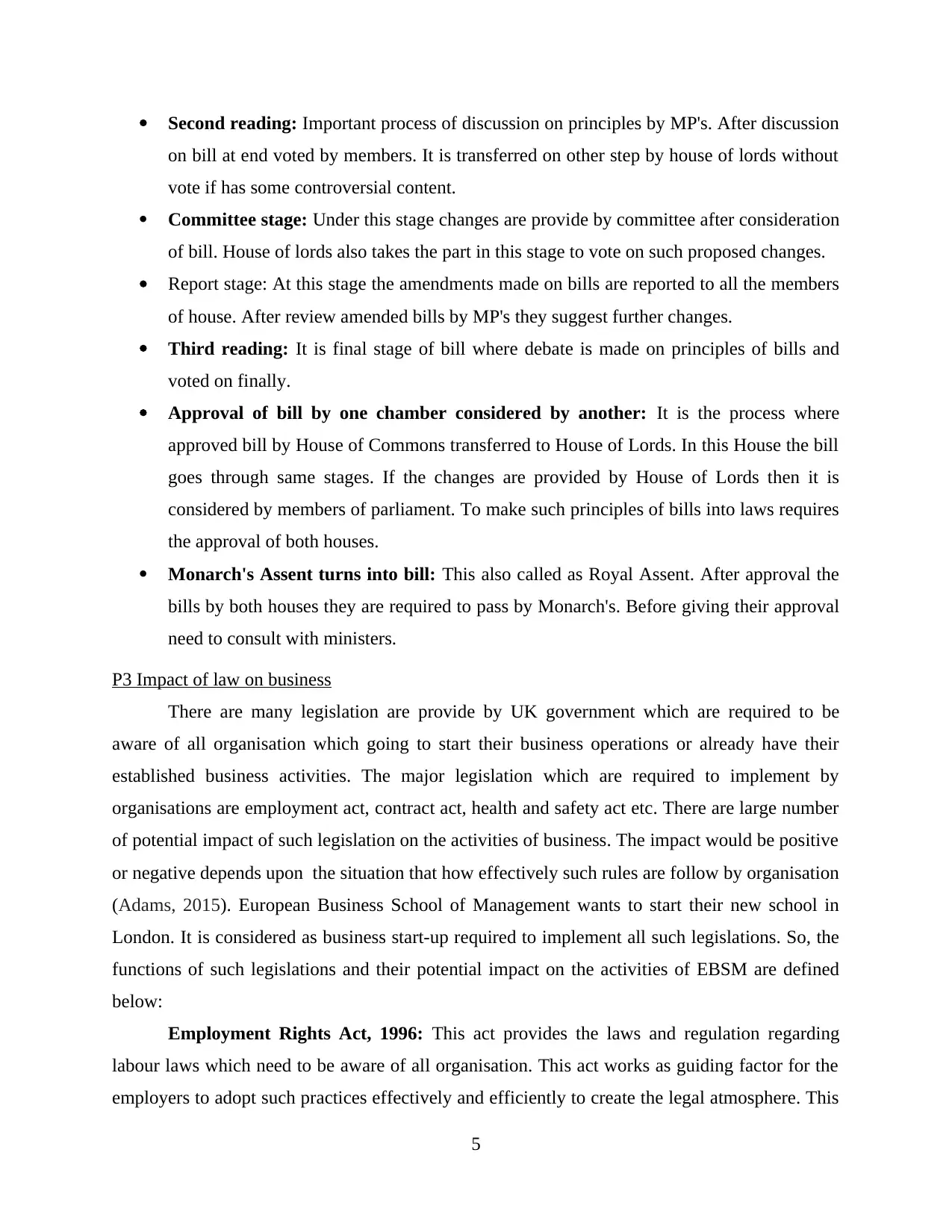
Second reading: Important process of discussion on principles by MP's. After discussion
on bill at end voted by members. It is transferred on other step by house of lords without
vote if has some controversial content.
Committee stage: Under this stage changes are provide by committee after consideration
of bill. House of lords also takes the part in this stage to vote on such proposed changes.
Report stage: At this stage the amendments made on bills are reported to all the members
of house. After review amended bills by MP's they suggest further changes.
Third reading: It is final stage of bill where debate is made on principles of bills and
voted on finally.
Approval of bill by one chamber considered by another: It is the process where
approved bill by House of Commons transferred to House of Lords. In this House the bill
goes through same stages. If the changes are provided by House of Lords then it is
considered by members of parliament. To make such principles of bills into laws requires
the approval of both houses.
Monarch's Assent turns into bill: This also called as Royal Assent. After approval the
bills by both houses they are required to pass by Monarch's. Before giving their approval
need to consult with ministers.
P3 Impact of law on business
There are many legislation are provide by UK government which are required to be
aware of all organisation which going to start their business operations or already have their
established business activities. The major legislation which are required to implement by
organisations are employment act, contract act, health and safety act etc. There are large number
of potential impact of such legislation on the activities of business. The impact would be positive
or negative depends upon the situation that how effectively such rules are follow by organisation
(Adams, 2015). European Business School of Management wants to start their new school in
London. It is considered as business start-up required to implement all such legislations. So, the
functions of such legislations and their potential impact on the activities of EBSM are defined
below:
Employment Rights Act, 1996: This act provides the laws and regulation regarding
labour laws which need to be aware of all organisation. This act works as guiding factor for the
employers to adopt such practices effectively and efficiently to create the legal atmosphere. This
5
on bill at end voted by members. It is transferred on other step by house of lords without
vote if has some controversial content.
Committee stage: Under this stage changes are provide by committee after consideration
of bill. House of lords also takes the part in this stage to vote on such proposed changes.
Report stage: At this stage the amendments made on bills are reported to all the members
of house. After review amended bills by MP's they suggest further changes.
Third reading: It is final stage of bill where debate is made on principles of bills and
voted on finally.
Approval of bill by one chamber considered by another: It is the process where
approved bill by House of Commons transferred to House of Lords. In this House the bill
goes through same stages. If the changes are provided by House of Lords then it is
considered by members of parliament. To make such principles of bills into laws requires
the approval of both houses.
Monarch's Assent turns into bill: This also called as Royal Assent. After approval the
bills by both houses they are required to pass by Monarch's. Before giving their approval
need to consult with ministers.
P3 Impact of law on business
There are many legislation are provide by UK government which are required to be
aware of all organisation which going to start their business operations or already have their
established business activities. The major legislation which are required to implement by
organisations are employment act, contract act, health and safety act etc. There are large number
of potential impact of such legislation on the activities of business. The impact would be positive
or negative depends upon the situation that how effectively such rules are follow by organisation
(Adams, 2015). European Business School of Management wants to start their new school in
London. It is considered as business start-up required to implement all such legislations. So, the
functions of such legislations and their potential impact on the activities of EBSM are defined
below:
Employment Rights Act, 1996: This act provides the laws and regulation regarding
labour laws which need to be aware of all organisation. This act works as guiding factor for the
employers to adopt such practices effectively and efficiently to create the legal atmosphere. This
5
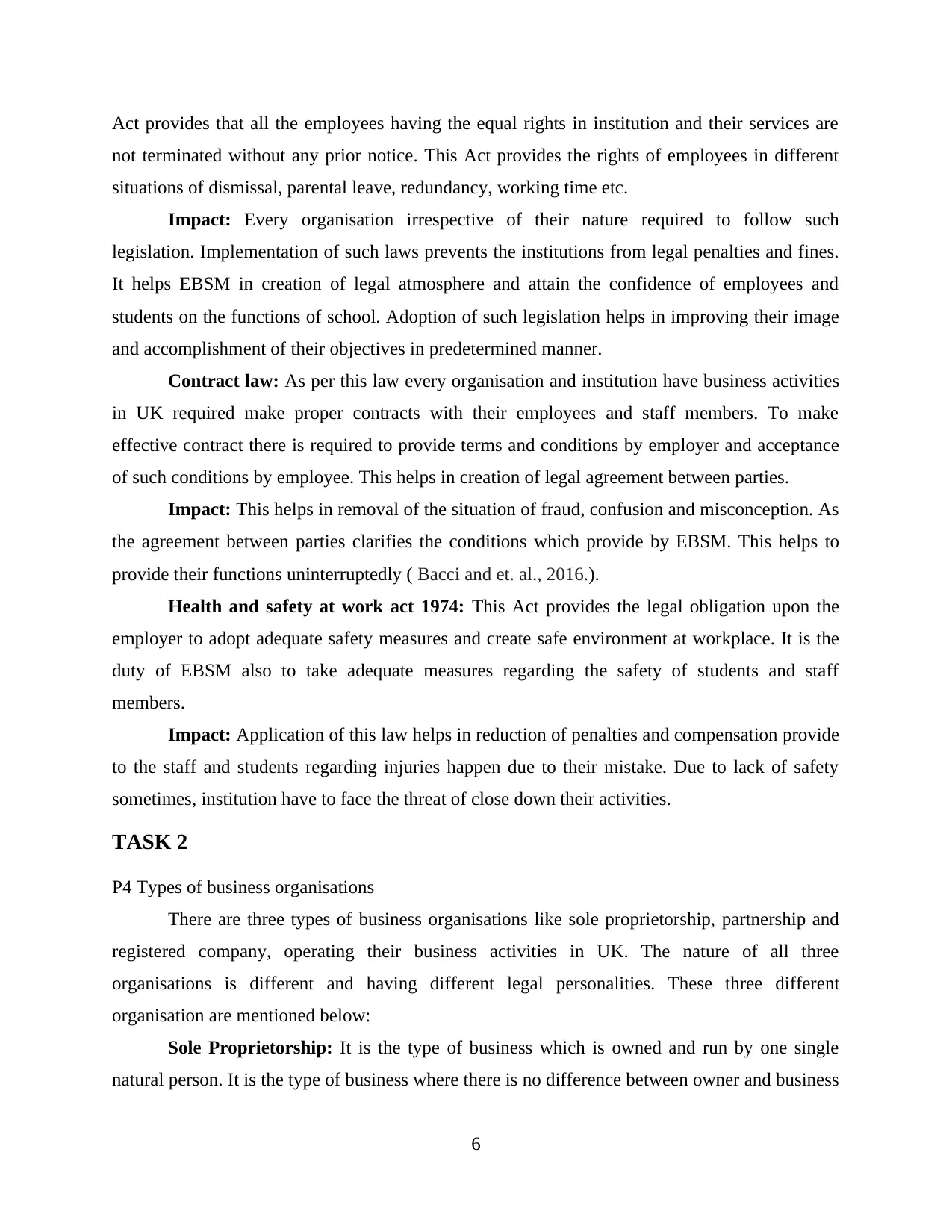
Act provides that all the employees having the equal rights in institution and their services are
not terminated without any prior notice. This Act provides the rights of employees in different
situations of dismissal, parental leave, redundancy, working time etc.
Impact: Every organisation irrespective of their nature required to follow such
legislation. Implementation of such laws prevents the institutions from legal penalties and fines.
It helps EBSM in creation of legal atmosphere and attain the confidence of employees and
students on the functions of school. Adoption of such legislation helps in improving their image
and accomplishment of their objectives in predetermined manner.
Contract law: As per this law every organisation and institution have business activities
in UK required make proper contracts with their employees and staff members. To make
effective contract there is required to provide terms and conditions by employer and acceptance
of such conditions by employee. This helps in creation of legal agreement between parties.
Impact: This helps in removal of the situation of fraud, confusion and misconception. As
the agreement between parties clarifies the conditions which provide by EBSM. This helps to
provide their functions uninterruptedly ( Bacci and et. al., 2016.).
Health and safety at work act 1974: This Act provides the legal obligation upon the
employer to adopt adequate safety measures and create safe environment at workplace. It is the
duty of EBSM also to take adequate measures regarding the safety of students and staff
members.
Impact: Application of this law helps in reduction of penalties and compensation provide
to the staff and students regarding injuries happen due to their mistake. Due to lack of safety
sometimes, institution have to face the threat of close down their activities.
TASK 2
P4 Types of business organisations
There are three types of business organisations like sole proprietorship, partnership and
registered company, operating their business activities in UK. The nature of all three
organisations is different and having different legal personalities. These three different
organisation are mentioned below:
Sole Proprietorship: It is the type of business which is owned and run by one single
natural person. It is the type of business where there is no difference between owner and business
6
not terminated without any prior notice. This Act provides the rights of employees in different
situations of dismissal, parental leave, redundancy, working time etc.
Impact: Every organisation irrespective of their nature required to follow such
legislation. Implementation of such laws prevents the institutions from legal penalties and fines.
It helps EBSM in creation of legal atmosphere and attain the confidence of employees and
students on the functions of school. Adoption of such legislation helps in improving their image
and accomplishment of their objectives in predetermined manner.
Contract law: As per this law every organisation and institution have business activities
in UK required make proper contracts with their employees and staff members. To make
effective contract there is required to provide terms and conditions by employer and acceptance
of such conditions by employee. This helps in creation of legal agreement between parties.
Impact: This helps in removal of the situation of fraud, confusion and misconception. As
the agreement between parties clarifies the conditions which provide by EBSM. This helps to
provide their functions uninterruptedly ( Bacci and et. al., 2016.).
Health and safety at work act 1974: This Act provides the legal obligation upon the
employer to adopt adequate safety measures and create safe environment at workplace. It is the
duty of EBSM also to take adequate measures regarding the safety of students and staff
members.
Impact: Application of this law helps in reduction of penalties and compensation provide
to the staff and students regarding injuries happen due to their mistake. Due to lack of safety
sometimes, institution have to face the threat of close down their activities.
TASK 2
P4 Types of business organisations
There are three types of business organisations like sole proprietorship, partnership and
registered company, operating their business activities in UK. The nature of all three
organisations is different and having different legal personalities. These three different
organisation are mentioned below:
Sole Proprietorship: It is the type of business which is owned and run by one single
natural person. It is the type of business where there is no difference between owner and business
6
⊘ This is a preview!⊘
Do you want full access?
Subscribe today to unlock all pages.

Trusted by 1+ million students worldwide
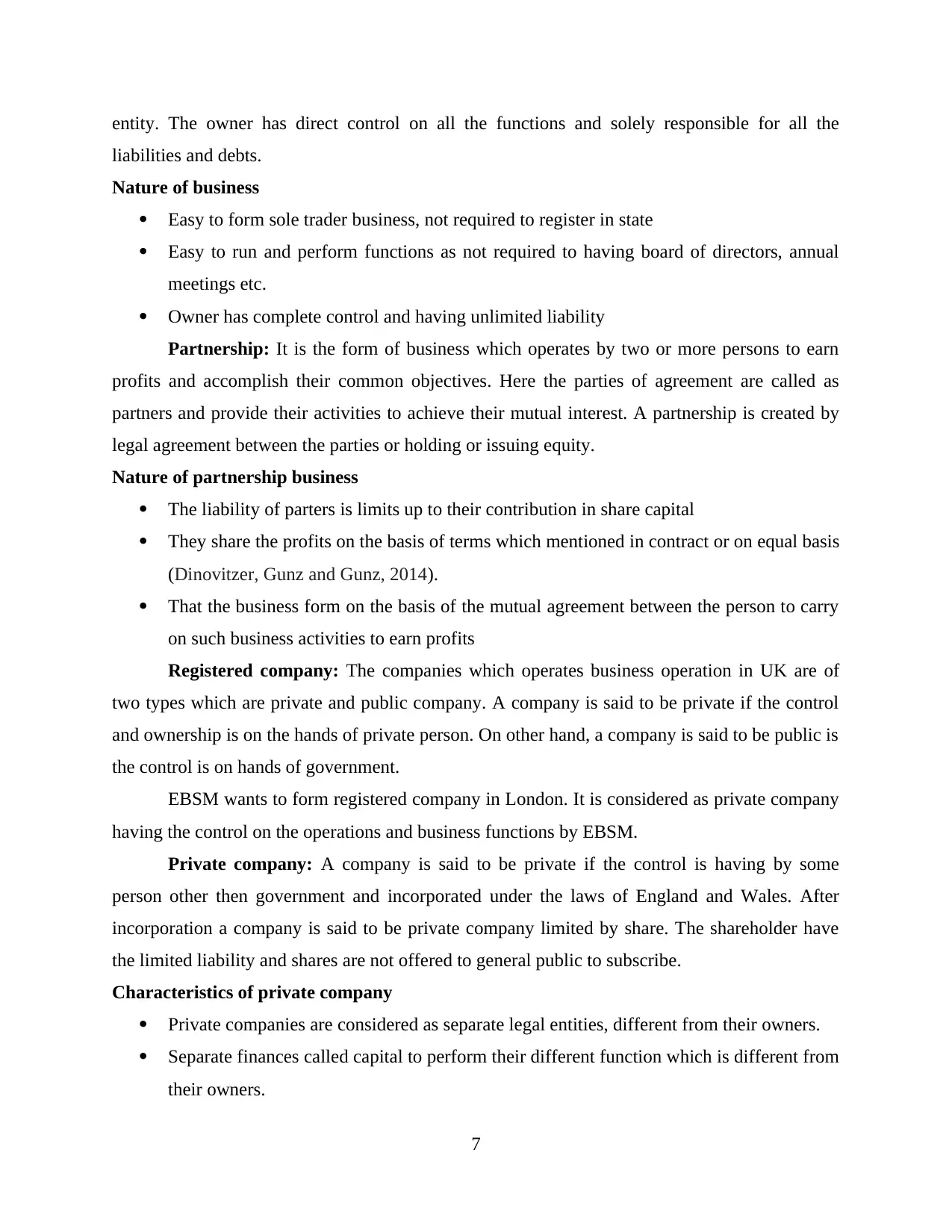
entity. The owner has direct control on all the functions and solely responsible for all the
liabilities and debts.
Nature of business
Easy to form sole trader business, not required to register in state
Easy to run and perform functions as not required to having board of directors, annual
meetings etc.
Owner has complete control and having unlimited liability
Partnership: It is the form of business which operates by two or more persons to earn
profits and accomplish their common objectives. Here the parties of agreement are called as
partners and provide their activities to achieve their mutual interest. A partnership is created by
legal agreement between the parties or holding or issuing equity.
Nature of partnership business
The liability of parters is limits up to their contribution in share capital
They share the profits on the basis of terms which mentioned in contract or on equal basis
(Dinovitzer, Gunz and Gunz, 2014).
That the business form on the basis of the mutual agreement between the person to carry
on such business activities to earn profits
Registered company: The companies which operates business operation in UK are of
two types which are private and public company. A company is said to be private if the control
and ownership is on the hands of private person. On other hand, a company is said to be public is
the control is on hands of government.
EBSM wants to form registered company in London. It is considered as private company
having the control on the operations and business functions by EBSM.
Private company: A company is said to be private if the control is having by some
person other then government and incorporated under the laws of England and Wales. After
incorporation a company is said to be private company limited by share. The shareholder have
the limited liability and shares are not offered to general public to subscribe.
Characteristics of private company
Private companies are considered as separate legal entities, different from their owners.
Separate finances called capital to perform their different function which is different from
their owners.
7
liabilities and debts.
Nature of business
Easy to form sole trader business, not required to register in state
Easy to run and perform functions as not required to having board of directors, annual
meetings etc.
Owner has complete control and having unlimited liability
Partnership: It is the form of business which operates by two or more persons to earn
profits and accomplish their common objectives. Here the parties of agreement are called as
partners and provide their activities to achieve their mutual interest. A partnership is created by
legal agreement between the parties or holding or issuing equity.
Nature of partnership business
The liability of parters is limits up to their contribution in share capital
They share the profits on the basis of terms which mentioned in contract or on equal basis
(Dinovitzer, Gunz and Gunz, 2014).
That the business form on the basis of the mutual agreement between the person to carry
on such business activities to earn profits
Registered company: The companies which operates business operation in UK are of
two types which are private and public company. A company is said to be private if the control
and ownership is on the hands of private person. On other hand, a company is said to be public is
the control is on hands of government.
EBSM wants to form registered company in London. It is considered as private company
having the control on the operations and business functions by EBSM.
Private company: A company is said to be private if the control is having by some
person other then government and incorporated under the laws of England and Wales. After
incorporation a company is said to be private company limited by share. The shareholder have
the limited liability and shares are not offered to general public to subscribe.
Characteristics of private company
Private companies are considered as separate legal entities, different from their owners.
Separate finances called capital to perform their different function which is different from
their owners.
7
Paraphrase This Document
Need a fresh take? Get an instant paraphrase of this document with our AI Paraphraser
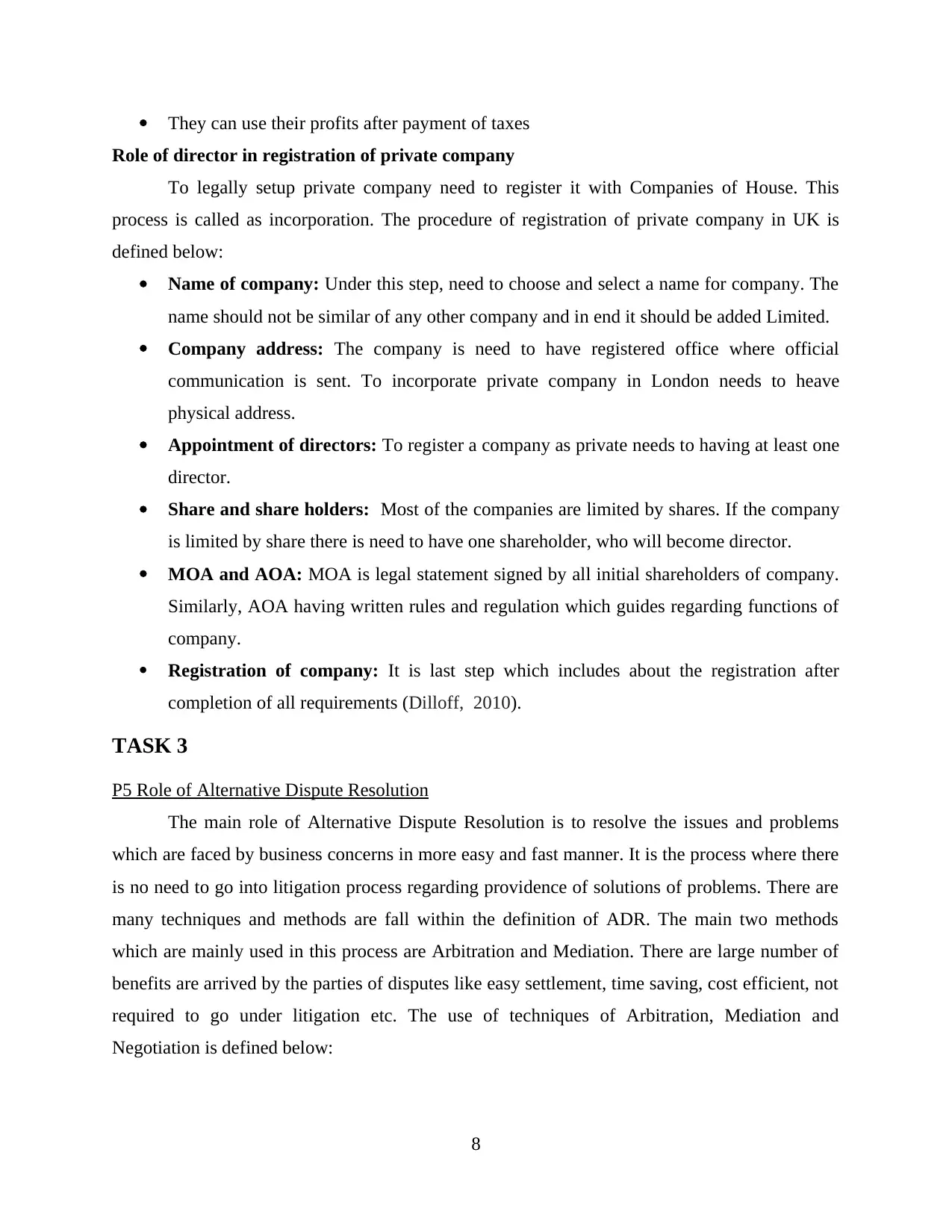
They can use their profits after payment of taxes
Role of director in registration of private company
To legally setup private company need to register it with Companies of House. This
process is called as incorporation. The procedure of registration of private company in UK is
defined below:
Name of company: Under this step, need to choose and select a name for company. The
name should not be similar of any other company and in end it should be added Limited.
Company address: The company is need to have registered office where official
communication is sent. To incorporate private company in London needs to heave
physical address.
Appointment of directors: To register a company as private needs to having at least one
director.
Share and share holders: Most of the companies are limited by shares. If the company
is limited by share there is need to have one shareholder, who will become director.
MOA and AOA: MOA is legal statement signed by all initial shareholders of company.
Similarly, AOA having written rules and regulation which guides regarding functions of
company.
Registration of company: It is last step which includes about the registration after
completion of all requirements (Dilloff, 2010).
TASK 3
P5 Role of Alternative Dispute Resolution
The main role of Alternative Dispute Resolution is to resolve the issues and problems
which are faced by business concerns in more easy and fast manner. It is the process where there
is no need to go into litigation process regarding providence of solutions of problems. There are
many techniques and methods are fall within the definition of ADR. The main two methods
which are mainly used in this process are Arbitration and Mediation. There are large number of
benefits are arrived by the parties of disputes like easy settlement, time saving, cost efficient, not
required to go under litigation etc. The use of techniques of Arbitration, Mediation and
Negotiation is defined below:
8
Role of director in registration of private company
To legally setup private company need to register it with Companies of House. This
process is called as incorporation. The procedure of registration of private company in UK is
defined below:
Name of company: Under this step, need to choose and select a name for company. The
name should not be similar of any other company and in end it should be added Limited.
Company address: The company is need to have registered office where official
communication is sent. To incorporate private company in London needs to heave
physical address.
Appointment of directors: To register a company as private needs to having at least one
director.
Share and share holders: Most of the companies are limited by shares. If the company
is limited by share there is need to have one shareholder, who will become director.
MOA and AOA: MOA is legal statement signed by all initial shareholders of company.
Similarly, AOA having written rules and regulation which guides regarding functions of
company.
Registration of company: It is last step which includes about the registration after
completion of all requirements (Dilloff, 2010).
TASK 3
P5 Role of Alternative Dispute Resolution
The main role of Alternative Dispute Resolution is to resolve the issues and problems
which are faced by business concerns in more easy and fast manner. It is the process where there
is no need to go into litigation process regarding providence of solutions of problems. There are
many techniques and methods are fall within the definition of ADR. The main two methods
which are mainly used in this process are Arbitration and Mediation. There are large number of
benefits are arrived by the parties of disputes like easy settlement, time saving, cost efficient, not
required to go under litigation etc. The use of techniques of Arbitration, Mediation and
Negotiation is defined below:
8
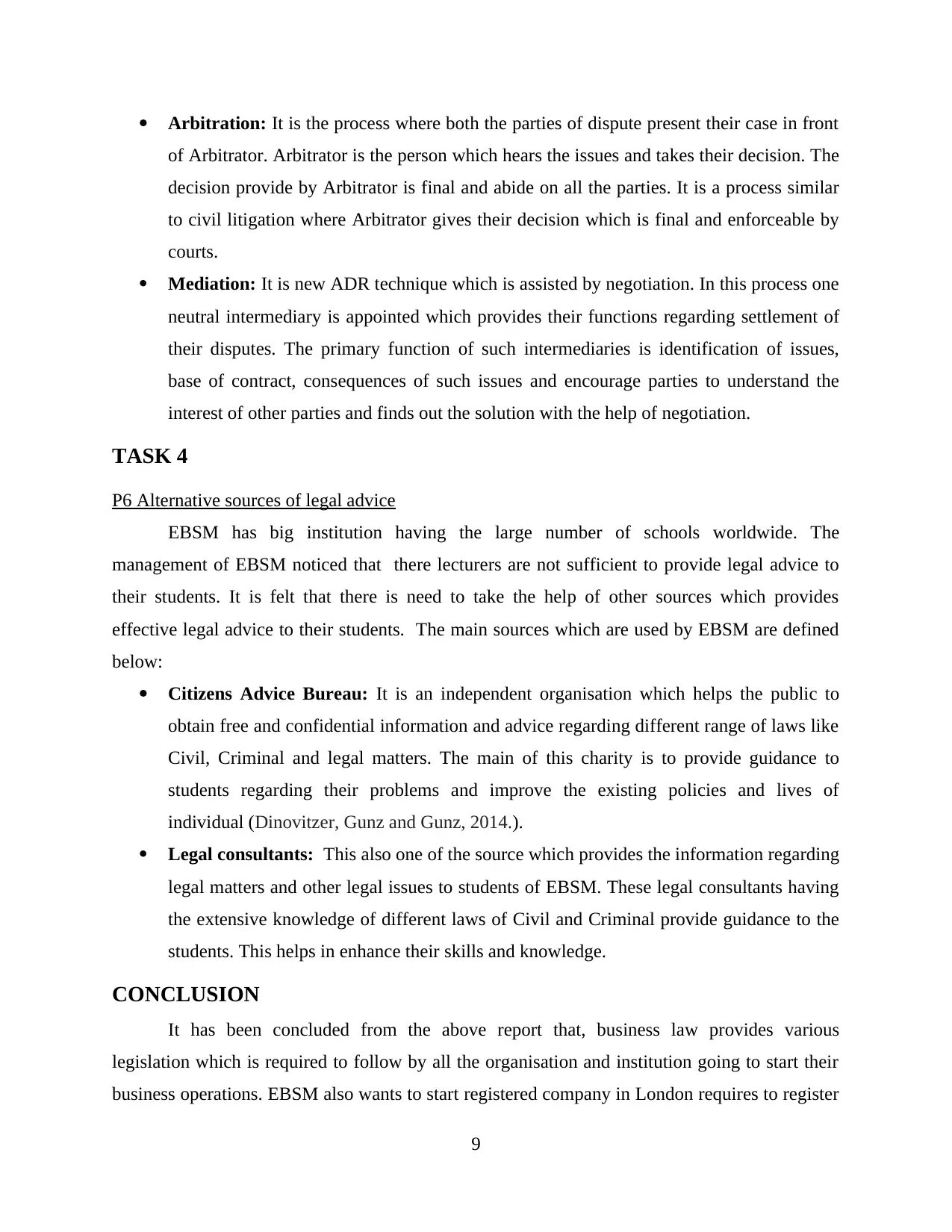
Arbitration: It is the process where both the parties of dispute present their case in front
of Arbitrator. Arbitrator is the person which hears the issues and takes their decision. The
decision provide by Arbitrator is final and abide on all the parties. It is a process similar
to civil litigation where Arbitrator gives their decision which is final and enforceable by
courts.
Mediation: It is new ADR technique which is assisted by negotiation. In this process one
neutral intermediary is appointed which provides their functions regarding settlement of
their disputes. The primary function of such intermediaries is identification of issues,
base of contract, consequences of such issues and encourage parties to understand the
interest of other parties and finds out the solution with the help of negotiation.
TASK 4
P6 Alternative sources of legal advice
EBSM has big institution having the large number of schools worldwide. The
management of EBSM noticed that there lecturers are not sufficient to provide legal advice to
their students. It is felt that there is need to take the help of other sources which provides
effective legal advice to their students. The main sources which are used by EBSM are defined
below:
Citizens Advice Bureau: It is an independent organisation which helps the public to
obtain free and confidential information and advice regarding different range of laws like
Civil, Criminal and legal matters. The main of this charity is to provide guidance to
students regarding their problems and improve the existing policies and lives of
individual (Dinovitzer, Gunz and Gunz, 2014.).
Legal consultants: This also one of the source which provides the information regarding
legal matters and other legal issues to students of EBSM. These legal consultants having
the extensive knowledge of different laws of Civil and Criminal provide guidance to the
students. This helps in enhance their skills and knowledge.
CONCLUSION
It has been concluded from the above report that, business law provides various
legislation which is required to follow by all the organisation and institution going to start their
business operations. EBSM also wants to start registered company in London requires to register
9
of Arbitrator. Arbitrator is the person which hears the issues and takes their decision. The
decision provide by Arbitrator is final and abide on all the parties. It is a process similar
to civil litigation where Arbitrator gives their decision which is final and enforceable by
courts.
Mediation: It is new ADR technique which is assisted by negotiation. In this process one
neutral intermediary is appointed which provides their functions regarding settlement of
their disputes. The primary function of such intermediaries is identification of issues,
base of contract, consequences of such issues and encourage parties to understand the
interest of other parties and finds out the solution with the help of negotiation.
TASK 4
P6 Alternative sources of legal advice
EBSM has big institution having the large number of schools worldwide. The
management of EBSM noticed that there lecturers are not sufficient to provide legal advice to
their students. It is felt that there is need to take the help of other sources which provides
effective legal advice to their students. The main sources which are used by EBSM are defined
below:
Citizens Advice Bureau: It is an independent organisation which helps the public to
obtain free and confidential information and advice regarding different range of laws like
Civil, Criminal and legal matters. The main of this charity is to provide guidance to
students regarding their problems and improve the existing policies and lives of
individual (Dinovitzer, Gunz and Gunz, 2014.).
Legal consultants: This also one of the source which provides the information regarding
legal matters and other legal issues to students of EBSM. These legal consultants having
the extensive knowledge of different laws of Civil and Criminal provide guidance to the
students. This helps in enhance their skills and knowledge.
CONCLUSION
It has been concluded from the above report that, business law provides various
legislation which is required to follow by all the organisation and institution going to start their
business operations. EBSM also wants to start registered company in London requires to register
9
⊘ This is a preview!⊘
Do you want full access?
Subscribe today to unlock all pages.

Trusted by 1+ million students worldwide
1 out of 14
Related Documents
Your All-in-One AI-Powered Toolkit for Academic Success.
+13062052269
info@desklib.com
Available 24*7 on WhatsApp / Email
![[object Object]](/_next/static/media/star-bottom.7253800d.svg)
Unlock your academic potential
Copyright © 2020–2026 A2Z Services. All Rights Reserved. Developed and managed by ZUCOL.





